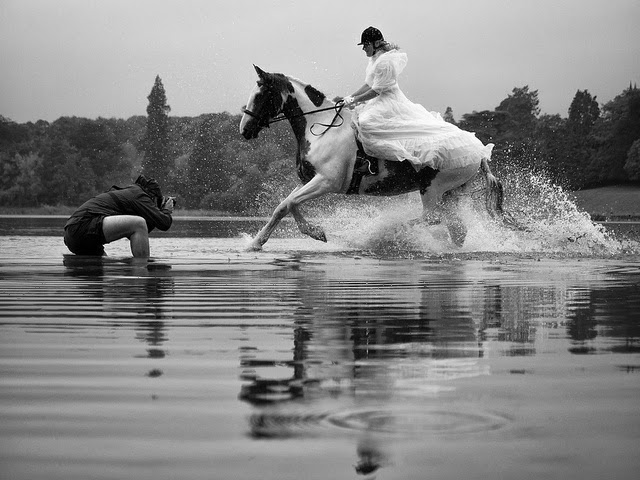I feel silly.
For years I've noticed a technique of Stephen King's, I've even written about it and mentioned that it seemed to be a strange contortionist amalgam of first and third person. But I didn't have a name for it.
Until now! Yes, I am doing a happy dance. And all because of this article: "So you want to be a writer ...".[4]
Free Indirect Style: What Is It And Why Should You Care?
Jon Gingerich writes that a "benefit of Free Indirect Discourse is it's a more comprehensive way to tell a story. By temporarily breaking away from the narrator's voice within descriptive passages, the reader gets to see things not only through the narrator’s eyes but through the character's eyes as well."[2]
When a skilled writer, someone like Stephen King, uses free indirect speech it is as though he gently pushes the narrator out of the way--or as though he, as storyteller, steps aside--and allows the reader to know the innermost thoughts of the character.
To put it simply (if rather dramatically), in a master storyteller's hands free indirect speech can be used to lay bare a character's soul.
See what you think. Here's an example of free indirect speech from Stephen King's book Under The Dome:
"Big Jim also did not ask Who did you sleep with? He had other concerns than whom his son might be diddling; he was just glad the boy hadn't been among the fellows who'd done their business with that nasty piece of trailer trash out of Motton Road. Doing business with that sort of girl was a good way to catch something and get sick.
"He's already sick, a voice in Big Jim's head whispered. It might have been the fading voice of his wife. Just look at him.
"That voice was probably right, but this morning he had greater concerns than Junior Rennie's eating disorder, or whatever it was."
In the quoted paragraphs, above, whose voice is it? Yes, it's the voice of the narrator (King employs an omniscient narrator; he/she/it is no one in the story and the narrator has godlike knowledge), but we get Big Jim's voice peeking through. We have access to the character's thoughts, we hear--not the narrator's voice--but Big Jim's. For example, in the first paragraph, the narrator would not say "diddling," that's Big Jim's word.
That said, the narrator--and likely the author--are evident in the text along with Big Jim. For example, Big Jim doesn't strike me as the kind of person who would be fastidious about the use of "who" and "whom."
In the last paragraph the narrator's voice is replaced by Big Jim's; it's almost as though the narrator has temporarily submerged himself within the consciousness of Big Jim; or, perhaps, it is that the narrator has simply stepped aside. He/she/it is no longer between you and the character; it's just you and Big Jim and you're like a god in that, in that moment, you know him. He is laid bare before you; his thoughts, his hopes, his ambitions. The kind of man he is.
That is what--or at least part of what--can be so seductive about reading Stephen King's books. The slightly voyeuristic promise of being introduced to characters that you come to know completely. Intimately. That you come to know even as you know yourself.
That also shows us one of the principle strengths of free indirect discourse: intimacy.
To sum up: In free indirect discourse the narrator can seem to dip down into a character and reveal to you their inner workings both through their thoughts (/mental workings) and their speech. In a sense it is third person temporarily masquerading as first person and, as such, goes a long way to eliminating the distance between narrator and character--as well as (and perhaps more importantly) between reader and character.[5]
Direct Speech vs Normal Indirect Speech vs Free Indirect Speech
Free indirect speech seems like it can be powerful tool but if you're still wondering what the heck it is, perhaps this will help.
Direct Speech
Direct speech is quoted: Bob scowled up at the dark clouds. "Ahw," he said, the sound halfway between a curse and a sneeze. "Gonna rain."
In direct speech, the reader hears from the character himself; in this case, from Bob. Because this is Bob speaking, the timber of his voice, the kinds of words he uses, and so on, are going to be different from those the (omniscient) narrator uses.
Normal Indirect Speech
Normal indirect speech is reported: Bob scowled up at the dark clouds and thought to himself that it would rain.
This speech is indirect because we don't hear it from the character himself. What Bob says and does and thinks is filtered through the narrator. As a result we lose the timber of Bob's voice as well as the particular words he, as opposed to the narrator, would use. When I read normal indirect speech it can feel as though a veil has been drawn over the character, over his mind, his essence, and that I am forced to see him through the lens of the narrator's thoughts and feelings.
Free Indirect Speech
Here's an example of free indirect speech: Bob scowled up at the dark clouds; yep, it was gonna rain.
Here, as with direct speech, the narrator is shunted aside. You, the reader, no longer look at the character through the lens of the narrator's beliefs and hopes and judgements. Here you are shown Bob's unadulterated, unfiltered, thoughts as he thinks them.
Free indirect speech: who started this wackiness?
Apparently, nineteenth century French novelist Flaubert was the first to be consciously aware of it as a style but both Goethe and Jane Austen used free indirect style consistently. Other practitioners of the form were: Franz Kafka, James Joyce, Virginia Woolf and D.H. Lawrence. [1]
Share your thoughts! What do you think of free indirect discourse? Do you enjoy reading authors who use the technique? Have you used it? Would you?
Notes
1. Free indirect speech, Wikipedia.
4. The article, So You want to be a writer ... is a collection of reactions--all by author-teachers--to Hanif Kureishi's statement that creative writing courses are a waste of time. It was Philip Hensher's essay that included the sentence that opened my eyes: "The focus [in Hensher's writing classes] is on technique as well as emotion and experience. Is the presiding consciousness the right one? Does he need to filter everything through his awareness? Is this the right tense? What is this thing called free indirect style?"
Miscellaneous Writing Links
- Celebrate the force of fiction (the Guardian)
Photo credit: "Cap Formentor" by *Light Painting* under Creative Commons Attribution 2.0.













